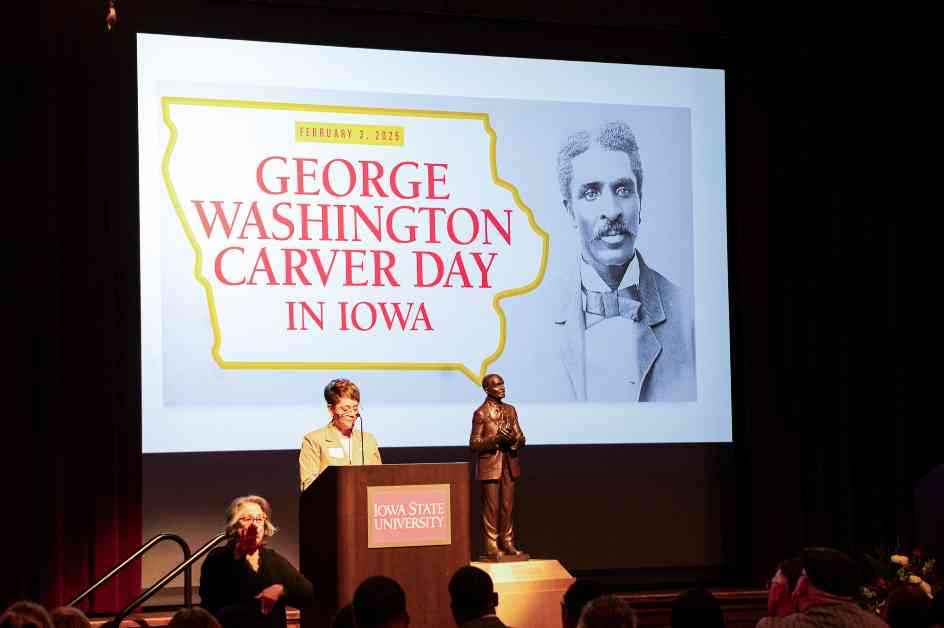Iowa State University commemorated George Washington Carver Day on Monday, marking the occasion with a recognition program held in the Memorial Union’s Great Hall. The event featured Jewel Bronaugh as the keynote speaker on February 3, 2025, in Ames, Iowa. The university celebrated Carver’s enduring legacy, reflecting on his life, accomplishments, and the impact he made on society.
Dan Robison, the Dean of the College of Agriculture and Life Sciences, highlighted the significance of honoring Carver, not only for his resilience and achievements but also for the inspiration and encouragement his legacy continues to provide. Robison emphasized the importance of reflecting on Carver’s life and work to inspire positive change in the world today.
Born into slavery on a small farm in Missouri in the 1860s, Carver’s early life was marked by hardship and adversity. Following the abolition of slavery in Missouri in 1865, Carver, along with his mother and sister, found freedom and the opportunity to pursue his passions in agriculture and plants. Despite facing numerous challenges, Carver’s love for nature and his insatiable curiosity for learning set him on a path of discovery and innovation.
Jewel Bronaugh, the president and CEO of the 1890 Universities Foundation, underscored Carver’s dedication to education and his relentless pursuit of knowledge. She emphasized Carver’s belief that education was the key to unlocking doors of freedom and empowerment. Carver’s journey from being born into slavery to becoming a trailblazing scientist and educator serves as a testament to the transformative power of education and determination.
Carver’s Educational Journey and Impact
Carver’s educational journey took him from Simpson College, where he studied art and piano, to Iowa State University, where he became the first African American student. He obtained his bachelor’s and master’s degrees in agricultural science from Iowa State, setting the stage for a remarkable career in academia and research. Carver’s tenure at Iowa State not only shaped his scholarly pursuits but also laid the foundation for his groundbreaking work in agriculture and sustainability.
Upon receiving an offer to join Tuskegee University as a faculty member, Carver embraced the opportunity to make a lasting impact on students and the community. Bronaugh highlighted Carver’s 47-year tenure at Tuskegee University, where he inspired generations of students to pursue education and agriculture as pathways to upliftment and progress. Carver’s commitment to his students and his dedication to bridging racial divides through education and innovation left an indelible mark on Tuskegee University and the broader academic community.
Legacy of Innovation and Inspiration
Carver’s legacy extended beyond the confines of the classroom, as he spearheaded outreach programs for impoverished Black farmers in the South. His advocacy for sustainable agriculture practices, including crop rotation and the use of organic fertilizers, revolutionized farming techniques and empowered communities to thrive. Bronaugh emphasized Carver’s belief that fertile soil cultivates prosperous societies, underscoring the importance of sustainable practices in fostering growth and development.
The event at Iowa State University also recognized Frederick Douglass Patterson, a distinguished graduate of the institution known for his visionary contributions to African American higher education. Patterson’s legacy as an educator and innovator resonated with the audience, highlighting his transformative impact on Tuskegee University and the fields of engineering, dietetics, and aeronautical science. Patterson’s pioneering spirit and commitment to excellence mirrored Carver’s dedication to education and empowerment.
To honor the legacies of both George Washington Carver and Frederick Douglass Patterson, Iowa State University hosted a poster competition, inviting students to create artwork that showcased the enduring impact of these trailblazing figures. The competition winners were recognized for their creativity and artistic interpretations of Carver and Patterson’s contributions to society.
As the event concluded, Bronaugh reflected on Carver’s multifaceted identity as an agronomist, artist, educator, conservationist, and humanitarian. She emphasized Carver’s enduring legacy of hope and purpose, underscoring his ability to inspire future generations to pursue their dreams and make a difference in the world. Carver’s life serves as a beacon of light, reminding us of the transformative power of education, innovation, and perseverance.









